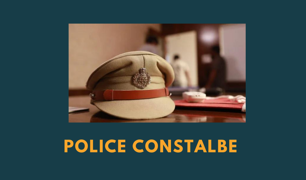A Police Constable is the lowest-ranking officer in the police department, but their role is crucial in maintaining law and order. Police constables are typically involved in tasks such as investigating crimes, controlling traffic, and ensuring public peace.
Key Duties of a Police Constable:
- Maintaining Law and Order: The primary duty of a police constable is to maintain peace and law and order in society. They patrol public areas and try to prevent any form of disorder.
- Investigating Crimes: Constables are often the first to arrive at crime scenes and conduct initial investigations. They collect evidence and report the crime to higher authorities.
- Traffic Control: Constables are responsible for controlling traffic on the roads. They enforce traffic rules and help reduce traffic congestion.
- Crowd Control: During large events, protests, or public gatherings, police constables manage the crowd to prevent any disturbances.
- Arrests and Custody: Police constables are responsible for arresting criminals and presenting them before the court or at the police station.
- Assisting the Public: Constables are always ready to assist the public. Whether it's helping a lost person or providing assistance in an emergency, constables are there for the community.
Importance of the Role of a Police Constable:
The role of a police constable is the foundation of the police force. They play a vital role in maintaining law and order in society and are in direct contact with the general public. Their work and responsibilities support higher-ranking officers in the police force and help in maintaining peace and security in the community.
Proccess for Police constable
1. Educational Qualification:
- 10th or 12th Pass: To become a police constable, you need to have at least passed the 10th or 12th standard.
2. Age Limit:
- Age Limit: Generally, candidates between 18 and 25 years of age can apply. However, age relaxation is provided for reserved categories.
3. Physical Standards:
- Height: Typically, the minimum height for males is 170 cm, and for females, it is 157 cm (may vary slightly depending on the state).
- Chest (for males): Generally, the chest measurement should be 80-85 cm (expanded).
- Physical Endurance Test: This includes running, long jump, high jump, etc.
4. Written Examination:
- Written Examination: This includes questions related to general knowledge, reasoning, mathematics, and English/Hindi language. The exam pattern may vary at the state or central level.
5. Physical Efficiency Test (PET):
- Running: For males, a 1600-meter run, and for females, an 800-meter run is required.
- Long Jump: For males, a long jump of 12-15 feet, and for females, 8-10 feet is required.
- High Jump: For males, a high jump of 3-4 feet, and for females, 2.5-3 feet is required.
6. Medical Examination:
- Medical Examination: The candidate's physical and mental health is checked. Vision, hearing, and other medical parameters are examined.
7. Document Verification:
- Document Verification: The educational certificates, identification documents, caste certificates, etc., of selected candidates are verified.
8. Training:
- Training: Selected candidates undergo training at a police training school/academy. During training, they are taught various duties, weapon handling, law enforcement, etc.
9. Final Appointment:
- Final Appointment: After successfully completing the training, candidates are finally appointed, and they begin working as police constables.
Benefits of Becoming a Police Constable
There are several benefits of becoming a police constable, which are not only economic but also significant in social and personal life. Some of the major benefits are:
1. Job Security:
- Being a government job, a police constable’s position is secure. Along with job security, there is a regular salary and other benefits.
2. Good Salary and Allowances:
- The position of a police constable offers a good salary, with periodic increments. Additionally, allowances such as dearness allowance, house rent allowance (HRA), medical allowance, and travel allowance are also provided.
3. Pension and Provident Fund:
- Police constables receive pension and provident fund benefits, ensuring financial security after retirement.
4. Medical Facilities:
- Medical facilities are available for the police constable and their family. Treatment is provided in government hospitals, and in some states, medical insurance is also available.
5. Accommodation:
- In many police forces, government accommodation is provided for policemen, relieving them of the burden of rent.
6. Social Respect:
- Police constables are respected in society. They are responsible for maintaining law and order, which enhances their reputation in the community.
7. Career Growth and Promotion Opportunities:
- There are many opportunities for advancement from the position of a police constable. Based on experience and exams, they can be promoted to higher positions such as head constable, sub-inspector, inspector, etc.
8. Leave Benefits:
- Policemen are entitled to regular annual leave, casual leave, medical leave, etc., allowing them to balance their personal life.
9. Free Travel:
- Policemen are provided with free or concessional travel in government transport services, reducing their travel expenses.
10. Sense of Pride:
- Working as a police constable gives a person a sense of pride and self-respect, as they are serving their country and society.


